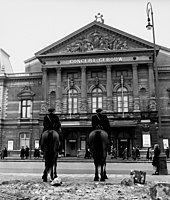Paul van Kempen
Paul van Kempen (born May 16, 1893 in Zoeterwoude , South Holland , † December 8, 1955 in Amsterdam ) was a Dutch - German conductor .
Kempen studied at the Amsterdam Conservatory from 1910 to 1913, composition and conducting with Julius Röntgen and Bernard Zweers , and violin with Louis Zimmerman. From 1913, when he was only 20, he played second violin in the Concertgebouw Orchestra under Willem Mengelberg , and one year later first violin. In 1916 he turned to German orchestras because of his sense of belonging to German culture and was a. a. Concertmaster in Poznan , Bad Nauheim and Dortmund . In 1932 he took German citizenship . After two years as music director in Oberhausen , he was chief conductor of the Dresden Philharmonic from 1934 to 1942 . Under his aegis, the orchestra developed into one of the best in Germany. In 1942 he succeeded Herbert von Karajan as general music director of the Aachen Symphony Orchestra , which ended in 1944 with the collapse of German cultural life due to the war. After the war he became conductor of the Philharmonic Radio Orchestra Hilversum in 1949, but was rather unpopular in the Netherlands due to his previous work in Germany. A concert in the Concertgebouw had to be canceled in 1951 due to tumult, his ambitions to become a permanent conductor with the Concertgebouw orchestra were hopeless. In 1953 he therefore returned to Germany as general music director in Bremen . He died of liver disease in an Amsterdam hospital in 1955 at the age of only 62 when his career was just about to pick up again.
Van Kempen, a great admirer of Willem Mengelberg, still belonged to a romantic-free generation of conductors who sought a personal interpretation through fluctuations in tempo and idiosyncratic interpretations. During his time in Dresden he made a series of recordings of symphonic works and some instrumental concerts for Deutsche Grammophon with the soloists Wilhelm Kempff and Enrico Mainardi . After the war, his wildly gloomy recordings of the fifth and sixth symphonies by Tchaikovsky and shorter works such as the Overture 1812 , which were the first of the 1950 newly founded Philips Phonographische Industrie with the Concertgebouw Orchestra, also became the third , seventh and eighth Beethoven -Symphony for the same label.
"If van Kempen had lived longer, Furtwängler's coat would undoubtedly have fallen on him instead of Klemperer ."
His grave is in the village cemetery of Blaricum in North Holland .
literature
- Kees de Leeuw: Dirigeren is geen beroep maar roeping. Leven en werk van Paul van Kempen (1893-1955) . Uitg. Gopher, Amsterdam, 2007. 269 p. ISBN 9789051794878
- Heiko Bockstiegel: Gentlemen, do you know the piece? , JLG Grimm, Wolfratshausen 1996, pp. 102-106.
| personal data | |
|---|---|
| SURNAME | Kempen, Paul van |
| BRIEF DESCRIPTION | Dutch-German conductor |
| DATE OF BIRTH | May 16, 1893 |
| PLACE OF BIRTH | Zoeterwoude near Leiden, the Netherlands |
| DATE OF DEATH | December 8, 1955 |
| Place of death | Amsterdam |

